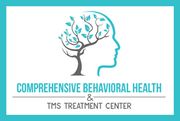Mental Health Professionals Explain 3 Common Forms of Depression

It’s perfectly natural to feel blue every now and again. However, if you find yourself feeling down more often than not, you may be suffering from clinical depression – a mental health condition with symptoms ranging from fatigue and hopelessness to physical pain. Depressive disorders come in a variety of types, and though they share many similarities, each has its own set of unique characteristics. Below, the mental health experts at Comprehensive Behavioral Health in Fishersville, VA, describe three common forms of depression as well as the available treatment options.
Mental Health Professionals Discuss 3 Common Forms of Depression
1. Major Depression
Those suffering from major depression may experience symptoms like hopelessness, extreme sadness, trouble concentrating, feelings of guilt, lack of energy, changes in eating or sleep habits, irritability, or thoughts of suicide. To obtain an official diagnosis, symptoms must remain present for a period of two weeks or more. Though some people only experience a single major depressive episode, in many cases, the condition tends to recur periodically.
Treatment for major depression may involve a combination of talk therapy and antidepressant medications. Start by speaking with a behavioral health professional to determine the best course of action for you.
2. Dysthymia
 This type of depression causes a low mood over an extended period of time. Symptoms of dysthymia include changes in appetite and sleep habits, fatigue, difficulty concentrating, and sadness.
This type of depression causes a low mood over an extended period of time. Symptoms of dysthymia include changes in appetite and sleep habits, fatigue, difficulty concentrating, and sadness.
Those diagnosed with dysthymia are generally found to respond better to talk therapy than medication, though some behavioral health experts suggest combining the two may lead to greater results.
3. Postpartum Depression
Women who experience major depression in the weeks and months following childbirth may be suffering from postpartum depression. The condition, which can also affect fathers, is often characterized by a variety of symptoms, including difficulty bonding with the child, excessive crying, insomnia, severe anxiety, and severe mood swings.
Untreated, postpartum depression can linger for several months or more. Mental health experts often implement a dual talk/medication treatment approach to help alleviate the symptoms.
As with any mental health disorder, depression is a condition best diagnosed by an experienced and knowledgeable behavioral health professional. If you or someone you love is struggling with depression, Comprehensive Behavioral Health is available to help. Call their Fishersville, VA, office at (540) 688-2646 or visit them online to learn more about their therapy and medication management services.
About the Business
Have a question? Ask the experts!
Send your question

